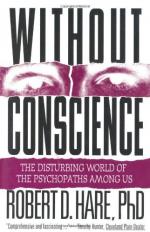
|
| Name: _________________________ | Period: ___________________ |
This quiz consists of 5 multiple choice and 5 short answer questions through Chapter 11, The Ethics of Labeling, pg 180-191.
Multiple Choice Questions
1. Which "special issue" makes the death penalty difficult to decide for those who must judge murderers in Texas?
(a) Did the murderer deliberately seek the death of his victim?
(b) Is the murderer mentally competent to stand trial?
(c) Is there a probability that the defendant will commit criminal acts of violence in the future?
(d) Was there reasonable provocation for the defendant's acts?
2. What is the author's term for "successful" psychopaths?
(a) Useful.
(b) Socialized.
(c) Subcriminal.
(d) Intelligent.
3. What does Hervey Cleckley see as the main difference between psychopaths who are not incarcerated and those who are?
(a) A more consistent appearance of normality.
(b) A more engaging line of talk.
(c) A better education.
(d) A better physical appearance.
4. Why does a prison psychiatrist claim the psychopathy checklist is valuable for parole boards?
(a) It is insurance against claims of improper parole.
(b) It helps boards quantify their decisions.
(c) It gives boards someone to blame when recidivism occurs.
(d) It ensures that no one who may commit future crime is released.
5. What question did Joe McGinniss wrestle with during his relationship with Jeffrey MacDonald?
(a) How could I have understood him?
(b) How could I have misunderstood him?
(c) How could I have missed all the signs?
(d) How could I have liked him?
Short Answer Questions
1. Who normally serves on parole boards?
2. What was Ted Bundy's opinion of guilt?
3. How do psychopaths treat those in positions inferior to them?
4. What often impresses people about psychopaths' discussion of technical subjects?
5. What does the author believe Grigson's approach lacks?
|
This section contains 326 words (approx. 2 pages at 300 words per page) |

|




